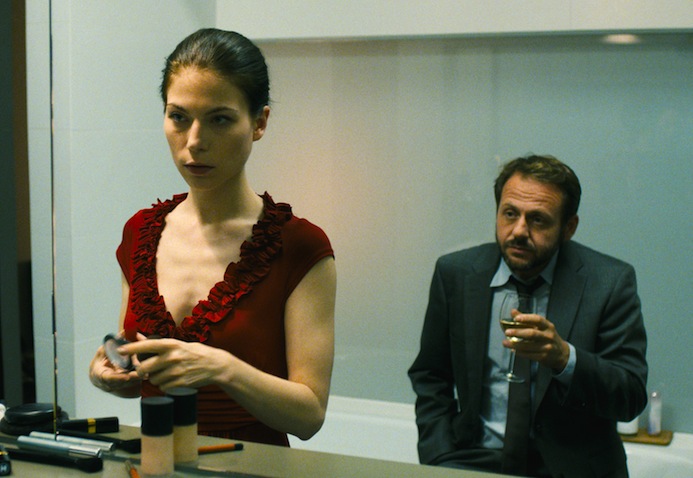
Götz Spielmann’s “October November” might be the quietest drama of 2013, an intimate, somber study of one family’s unsaid truths. It is also, however, a film that leaves little impression, making it a step backwards—or, at the very least, sideways—for the director of the stunning “Revanche.” Spielmann’s 2008 character study/thriller was deservedly nominated for a Best Foreign Language Film Oscar (2009), and drew an international spotlight to the Austrian filmmaker. His much-anticipated follow-up, “October November,” made its world premiere at the Toronto International Film Festival, and while it plays reasonably well in a festival setting, it is unlikely to make waves worldwide.

It is a family tale, a European cousin of some of Woody Allen’s Bergman-esque dramas (specifically “Interiors” and even “September”); if Mike Leigh had not already used the title “Secrets and Lies,” it would have been dead-on here. Sonja (Nora von Waldstätten) and Verena (Ursula Strauss) are two sisters with very different lives, yet more shared character traits than they would care to admit. Sonja is an actress whose busy life involves work, failed relationships, and more work. (“You’re only happy when you work,” she is rather inaccurately told.) Verena, meanwhile, still lives in the family home with her ailing father (Peter Simonischek, gives a beautifully exhausted performance as “Papa”), her good-natured, rather dull husband, and their sweet little boy. It is a large, rambling former inn that is occasionally still used for overnight guests.
We learn within the film’s first few minutes that Sonja and Verena are living secret lives. Sonja is accosted by the wife of a man she is seeing in the ladies’ room of an upscale restaurant, a knife-sharp scene that demonstrates Spielmann’s skill at letting drama slowly develop. (The man’s wife shows the oblivious Sonja a picture of her children, and replies to Sonja’s compliment with piercing questions: “You think they’re lovely? Then why are you destroying their lives?”) Back in the town Sonja grew up in, Verena has her own messy situation playing out. She is having an affair with her father’s attractive, caring physician (“The Lives of Others” star Sebastian Koch, used far more effectively here than he was in the execrable “A Good Day to Die Hard”).
The sisters are brought back together as Papa’s health worsens, and their frosty relationship grows frostier. For Sonja, a return home feels like a vacation from her busy everyday life, but for Verena, the sight of Sonja is a reminder of what she missed by staying home. Verena is especially on edge when Sonja is around Koch’s doctor; the look on her face when Sonja arrives home with Koch, happily announcing, “Look who I found!” is priceless. Later, Verena angrily tells Sonja, “Just drop the act. No one knows who you are anymore,” and the truth behind the statement makes the comments especially wounding. But just as wounding—and true—is Sonja’s reply: “You’re jealous of me, of my life. You chose this life. No one forced you into it.” Yet as we learn, much of the control the film’s character’s believe they have over their lives is false.

A major secret is revealed halfway through “October November” that lacks the impact it should, and fails to upend things the way we might expect. The way this is handled by Spielmann seems like a miss, as well as some strange aesthetic choices—particularly an awkwardly filmed near-death and some dopey dream sequences—and an oddly lackluster conclusion make for an overall disappointment. It is beautifully shot, well-acted by all (especially by Waldstätten, Strauss, and Simonischek), and filled with strong dialogue and a real sense of place. But despite the cast’s best efforts, it is never moving, and rarely surprising. A sense of surprise, so important an element of “Revanche,” might be the film’s biggest failure.
As “October November” draws to a close, it is difficult not to feel slightly on edge; it seems as if something momentous is on the verge of happening … And yet it never does. Spielmann is clearly uninterested in fireworks this time around, and while that is a bold dramatic choice, it is also an unsatisfying one. It is a film that starts with a quiet dinner, and ends with a quiet hug, and that’s the way Spielmann wants it. Certainly, “October November” is far, far from a bad film, but it is a curiously unmemorable one. And while it is unfair to overly compare it with “Revanche,” it is difficult not to. Perhaps if this was the director’s debut, audience response would be different. But after the high of “Revanche,” “October November” feels like a ho-hum medium. [C+]

